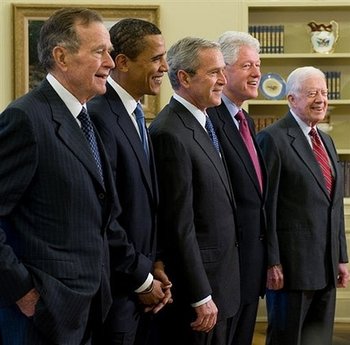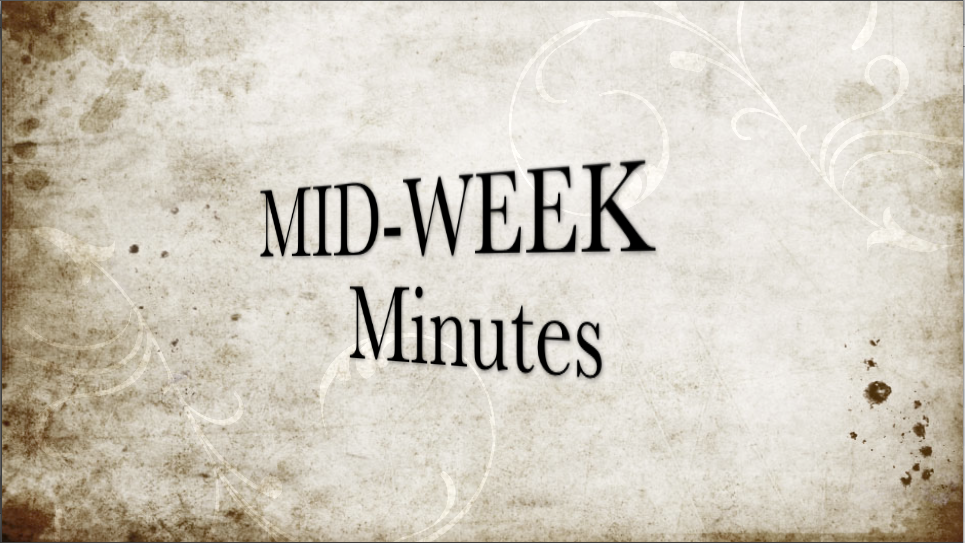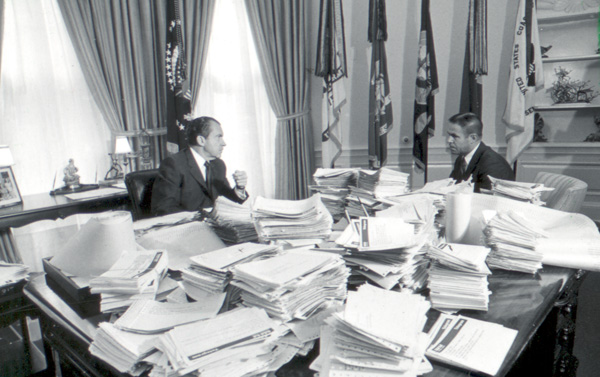
by Bret Capranica | Apr 1, 2011 | Featured Articles, Presidential History, Time/Life Management
Richard Nixon”™s approach to running the West Wing reshaped the role of the Chief of Staff to the point that it is still largely used to this day in the Office of the President. Interestingly, Eisenhower had a Chief of Staff, but most decisions were made by Cabinet Secretaries. Kennedy did not have a Chief of Staff and operated in a more free style with no intentional chain of command as to how decisions were made. Nixon changed the approach so that decisions were made in the White House and executed then by Cabinet Secretaries. He divided White House responsibilities into 3 areas: Domestic Council, National Security Council, and the Office of the President. Nixon wanted information mostly in written form and received it only from a few people with whom he would discuss it. They created the position of the Staff Secretariat who distributed the paper work appropriately. Trust was the most important commodity. Nixon was a very private person and preferred to consider succinct written proposals, summaries or analyses, with a few people. Decisions were made in the White House and Cabinet Secretaries executed those decisions. 7:30 a.m. was the start time for most White House senior officials. Nixon was careful with his public activities and focused on what would be the most significant issues. The president spent a tremendous amount of time on fewer things. Haldeman had a lack of ego, a passion for anonymity, but a self-confidence in his own ability. Trust and focus were his emphases. The story of the day, everyday, was “Think it Through!” Everything was thought through to the maximum. Every day at 2:00...

by Bret Capranica | Mar 30, 2011 | Pastoral Ministry, Worship
Mid-Week Minutes 3-30-11 from Summit Woods on Vimeo. Resources mentioned in the video: Gettymusic.com Here’s a video example of Keith and Kristyn Getty: Sovereign Grace Music Together for the Gospel Here’s some background on the making of the T4G album: Together for the Gospel Live Album from Sovereign Grace Ministries on Vimeo. Here’s an example of one of the songs sung at T4G: Red Mountain Music Indelible Grace...

by Bret Capranica | Mar 29, 2011 | Featured Articles, Presidential History, Time/Life Management
Last year on President”™s Day, Kelly and I took a trip down to Yorba Linda and the Richard Nixon Library and Foundation. Admission was free, so we joined some 5,000 other people taking advantage of the opportunity. The highlight of the day was the panel lecture on “The Effective Use of the President”™s Time.” The panel was made up of four men who served in the West Wing of the White House and, more specifically, worked directly under H. R. “Bob” Haldeman, Nixon”™s Chief of Staff. They discussed the climate of which Nixon assumed the presidency, how foreign trips were staffed, and most importantly, how they helped the President make the best use of his time. Nixon”™s end is usually where we begin in thinking about his time in office and tends to dominate the flavor of the entirety of his presidency. That is unfortunate. Many, initiatives, policies, and governmental advancements that remain in place today were initiated during his years in the White House. In fact, the entire structure of the modern day Office of the President was essentially created during his tenure and remains in tact today. The lecture was a fascinating look into the Presidency. Today and Friday I”™ll post my bulleted notes from the lecture. On Saturday, I”™ll give a few thoughts on how these themes could bring helpful consideration to an ordinary pastor”™s ministry. Nixon was friendly, but we were not friends. Nixon lost the 1960 election because he tried to run the campaign himself. In 1968 (the year he won the Presidency), he put key managers in every position. Haldeman issued a memo in the 1968...

by Bret Capranica | Mar 24, 2011 | Featured Articles, Pastoral Ministry, Worship
Carefully Think Read through Psalms 95-100; 145-150 and make a list of ways the psalmist outwardly expressed what he was inwardly delighted with. Why is music such a controversial element of church life? Read Ephesians 5:19 and list what you learn about the role of music in the life of the church. What role did music play in Exodus 15:1-18; 1 Samuel 16:14-23; 1 Chronicles 15:22; 16:4-6; 23:3-5; 25:1-7; 2 Chronicles 20; Nehemiah 12:42 Prayerfully Meditate How are you living out the expressions of praise you found in the psalms mentioned above? What keeps you from expressing your praise in the biblical ways you see in the Scriptures? How could Ephesians 5:19 affect your approach to singing this week? Actively Respond Pray for those who will be leading the church in our corporate gathering on Sunday. Pray that they will have a focused attention in leading the entire church in a biblical manner. Pray for all those who will be involved in the worship service, from instrumentalists to sound technicians to ushers. Pray that all we do will be done decently and orderly and to God”™s glory, and that we will be free from unnecessary distraction. Meditate often on Ephesians 5:19 and how it should instruct us regarding singing. Meditate on the lyrics to the songs we will be singing this Sunday. If you would like to hear a sample or actually purchase the song, click on the links below. We hope to regularly provide you with audio links to the songs we will sing so you can begin to build a personal library of music we use corporately....

by Bret Capranica | Mar 23, 2011 | Pastoral Ministry, Worship
New Project 5 from Summit Woods on Vimeo. Resources referenced in the video: The Valley of Vision Baptist Hymnal Trinity Hymnal 101 Hymn Stories Then Sings My...












